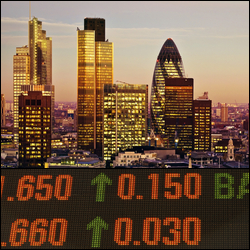
The CleanFinancial.com guide to tight spreads.
- Why Tight Spreads?
- What is the Spread?
- Wider Spreads at Night
- Tight Spreads
- Fixed Spreads vs Variable Spreads
- Companies That Offer Fixed Spreads
- Companies That Offer Variable Spreads
- Less Popular Markets with Wide Spreads
- Unexpectedly Wide Spreads
- Why Not Zero Spreads?
Why Tight Spreads?
This is quite simple, investors prefer tight spreads because a tighter spread means that the market being traded does not have to move as far before the position is profitable.What is the Spread?
With spread betting, you are quoted two prices e.g. the FTSE 100 is currently 6742.5 – 6743.5.The difference between the two prices is known as the ‘spread’. If the difference is 1 point, it’s known as a 1 point spread.
Many companies offer spreads of 1 point (or smaller) for popular and liquid markets like:
- FTSE 100 (UK 100)
- DAX (Germany 30)
- Dow Jones (Wall Street)
- EUR/GBP
- EUR/USD
- USD/JPY
Gold, crude oil, the NASDAQ 100 and the S&P500 tend to have slightly wider spreads of around 3-5 points. So not as tight as the above, but not prohibitive.
Wider Spreads at Night
A number of firms offer 24 hour trading (5 days a week).For 24 hour trading, the forex markets tends to be fairly consistent e.g. Financial Spreads keeps its EUR/USD and USD/JPY spreads at 0.8pts throughout the night.
However, the spreads on stock market indices are often wider in out-of-normal-market-hours trading. E.g. it’s common for the FTSE 100 spread to be 4 points from 11pm to 7am (London time).
Tight Spreads
In order to compare the markets, we have a series of spread betting comparison tables on our spread betting companies page.Alternatively see: Note that these tables compare companies with fixed spreads and the ‘typical spread’ of the companies with variable spreads.
Fixed Spreads vs Variable Spreads
Some companies offer fixed spreads e.g. the spread for a given market is fixed.E.g. Financial Spreads fix their FTSE 100 market at 1 point during market hours and at 5 points for out-of-hours trading.
The benefits are that:
- The spreads are quite tight
- The spreads are clear and you know what you are getting, so when you want to close your trade, you already know the cost of the spread
These companies will often quote their ‘Minimum Spreads’, i.e. the tightest their spread will get e.g. we have seen CMC Markets quote:
|
Index Markets
Dow Jones FTSE 100 DAX 30 NASDAQ 100 |
CMC Spread
0.9 0.9 0.9 0.9 |
|
Forex Markets
EUR-USD USD-JPY GBP-USD AUD-USD EUR-GBP EUR-JPY USD-CHF EUR-CHF USD-CAD GBP-JPY |
CMC Spread
0.9 0.9 1.0 1.0 1.0 1.5 1.9 2.0 2.0 2.9 |
It’s usually better to pay attention to the ‘Typical Spreads’ that these companies quote rather than their tightest (minimum) spread.
The Typical Spread is the average spread that clients have actually traded over a set period, e.g. in marketing promotions companies often quote a specific 2 week period of ‘Typical Spreads’.
If you are trading highly liquid markets during market hours, then you may be better off with variable spreads.
However, this editor prefers the clarity of trading fixed spreads. Also, these days the big firms tend to offer rather similar spreads.
Companies That Tend to Offer Fixed Spreads
- Financial Spreads
- Core Spreads
- City Index (fixed during market hours)
- ETX (non-major forex markets)
- IG Index (major index markets)
- Spreadex
Companies That Tend to Offer Variable Spreads
- City Index (variable during out-of-hours trading)
- CMC Markets
- ETX (major forex markets)
- IG Index (most markets)
- Inter Trader
Less Popular Markets with Wide Spreads
Spread betting can offer low cost trading on popular markets, however, but as soon as you start trading the less popular markets, the spreads quickly get wider.With wide spreads, the underlying market has to move a lot further before you can close your trade for a profit.
E.g. GFT normally quote the FTSE 100 at 1 point for in-hours trading, but their copper market has a 16 point spread, their Korea 200 index has a 20 point spread and their Mexico 35 Index has a 30+ point spread.
It’s a similar story with the other firms.
Unexpectedly Wide Spreads
As mentioned above, some firms that offer fixed spreads will have wider fixed spreads at night. Apart from that, they tend not to widen them.There are exceptions though, sometimes a spread betting company may need to be defensive during a Black Swan event, or market crash.
E.g. during the Japanese Tsunami of 2011, most firms widened the spread on their Nikkei 225 markets for a couple of days.
These events are rare though, companies like Capital Spreads, Financial Spreads and InterTrader did not widen their spreads during 2012 or 2013.
Why Not Zero Spreads?
If you think of the ‘spread’ as being like the spread betting companies’ commission, then it seems reasonable to pay something.You may see the occasional short-term zero point spread for marketing campaigns, but this editor is not keen on permanent zero point spreads.
If the company isn’t making much money then they will find it difficult to invest in better platforms. Also, if they aren’t making much money, how safe is my money?
World Spreads used to offer zero point spreads to its big clients for most popular markets. WorldSpreads also ended up in financial difficulties and closed. These events may or may not be related.
Either way, I want a tight spread but I still want my brokers to be profitable.
Spread betting and CFD trading carry a high level of risk to your capital and you may lose more than your initial investment. Spread betting and CFD trading may not be suitable for all investors. Only speculate with money that you can afford to lose. Please ensure you fully understand the risks involved and seek independent financial advice where necessary.

